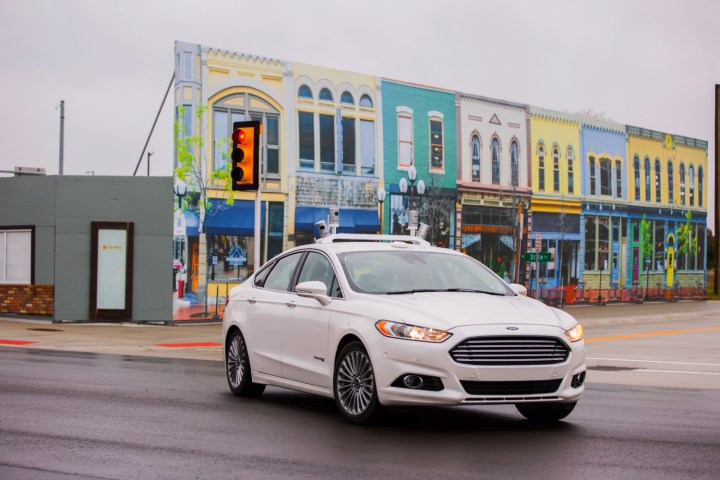
But a simulated city isn’t very useful without any self-driving cars to ply its streets. Ford says it’s the first manufacturer to test cars there, as part of its ongoing effort to put an autonomous car on sale at some future date. The University of Michigan believes its facility can help Ford accomplish this sooner by providing more realistic testing scenarios.
“The goal of Mcity is that we get a scaling factor,” said Ryan Eustice, University of Michigan associate professor and principal investigator in Ford’s collaboration with the school. “Every mile driven here can represent 10, 100, or 1,000 miles of on-road driving in terms of our ability to pack in the occurrences of difficult events,” he said.
Developing autonomous cars requires deliberate programming of software responses to specific scenarios, but a car needs to be exposed for them in order for engineers to determine how to do that programming. Mcity features everything from traffic lights to bike lanes, as well as a variety of road surfaces. This allows testers to simulate things that will happen in the real world, without the unpredictability and potential legal ramifications of testing cars on public roads.
Ford deployed the Fusion Hybrid Autonomous Research Vehicle it unveiled back in 2013 for testing at Mcity. The car uses a combination of front-facing cameras, radar and ultrasonic sensors, and four LiDAR sensors to generate a 3D map of its surroundings. The Fusion was developed in concert with the University of Michigan, and State Farm.
In addition to the Michigan testing program, Ford is working on autonomous cars out of a new research center in Silicon Valley that opened earlier this year. Self-driving cars are one prong of Ford’s “Smart Mobility Plan,” which encompasses multiple research projects focusing on trending technologies, also including connectivity and the use of big data.
Editors' Recommendations
- Here’s how Ford will give EV customers Tesla Supercharger access
- Goliath car screens have arrived, and Ford’s new software takes full advantage
- Cruise woes prompt production halt of fully driverless van
- Dubai Police to deploy driverless patrol cars with AI smarts
- Waymo expands robotaxi service area in San Francisco


